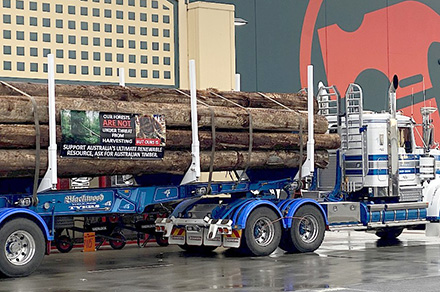Four log trucks this morning blocked the entrance to the Bunnings store at Traralgon in defence of forestry jobs. A Construction Forestry Maritime Mining and Energy Union (CFMMEU) statement this morning said the trucks were blocking the entrance to the Bunnings’ car park in protest of Bunnings’ “heartless and ill-informed decision” announced earlier this month to stop stocking local hardwood timber in their stores. Source: Timberbiz
The CFMMEU says the action is a sign of things to come at Bunnings Warehouses across Australia if it did not agree to reverse its ban on local timber.
The Australian Forest Products Association (AFPA) believes the blockade, and a promise by timber workers to undertake more of the same, should cause Bunnings management to reconsider its decision
“Timber workers will not sit back and be pushed around by big-end of town fat cats like those in Bunnings and Wesfarmers head offices,” said CFMMEU National Secretary Michael O’Connor.
And the CFMMEU also has the support of the Australian Forest Contractors Association.
“Regional Victoria is facing a jobs crisis, Bunnings’ short-sighted decision has added to the continued uncertainty in the industry and contractors are bearing the brunt of this. Bunnings must reverse their local timber ban immediately,” AFCA general manager Ms Stacey Gardner said.
Backing up the blockade this morning, hundreds of sawmill workers, contractors, and their crews are phoning Bunnings head office in Hawthorn East calling for the reversal of the decision.
The CFMMEU says thousands of Australians have now committed to boycotting Bunnings until they reverse their local timber ban.
“Bunnings need to explain why they have taken a hard-line against local workers, contractors and businesses, a line which decimates jobs, families and communities and given themselves the green light to import timber from Indonesian rainforests,” community advocate Ms Felecia Stevenson said.
The CFMMEU says that COVID-19 restrictions had so far prevented larger rallies, demonstrations, and actions at Bunnings’ busier warehouses such as those in metropolitan Melbourne.
The union says once it is safe to do so and COVID-19 restrictions ease they can expect similar action nationally.
Bunnings says the company only sources a small portion of VicForests’ harvest and was working with suppliers on transition plans that would minimise any impact to roles. They say that union claims of job losses have no basis in fact.
Director of Merchandise at Bunnings Warehouse, Phil Bishop, said the company is “aware of the gathering this morning in Traralgon and we have worked with Police to ensure the safety of our customers and those involved”.
“While we only sell a small portion of VicForests’ total harvest, we acknowledge some in the community are concerned about the industry,” he said.
“We are working closely with affected suppliers to establish transition plans that minimise potential impacts and during this time we’re continuing to accept timber from stock that is already harvested,” Mr Bishop said.
Bunnings said that as part of a transition plan, they are talking to ASH about several options, including sourcing timber from alternative sources to maintain the sale of their products through our stores.
AFPA CEO Ross Hampton said that Bunnings’ claimed that it has made this decision because it does not stock “illegal timber”.
But Mr Hampton said it was wrong to equate the tightly regulated, sustainably managed Victorian timber harvesting operations with the globally recognised definition of “illegal logging” which is unsanctioned, un-regulated and leading to deforestation where cleared forests are not regenerated.
“According to Interpol, between 15% and 30% of the timber trade in the world is ‘illegal’,” Mr Hampton said.
“That means more than $70 billion dollars’ worth of globally traded timber comes from illegal sources. None of that timber comes from the State government agencies which run accredited, audited and sustain-able native forestry operations in this country.”
Mr Hampton said that Bunnings had moved prematurely in not even waiting for the foreshadowed appeal of the Federal Court case on which it has based its decision.
“There are just four trees out of 10,000 used in native forestry in Victoria and it is 100% regrowth forestry. It is certified to the world’s largest global certification scheme called PEFC (trading as Responsible Wood). Old growth trees are protected. Every tree that is used is re-generated. It is completely sustainable environmentally and a vital driver of jobs in many regional Victorian towns.
“The tens of thousands of forest industry workers right around Australia, their families, and their communities appeal to Bunnings to announce it will reverse its decision,” Mr Hampton said.







